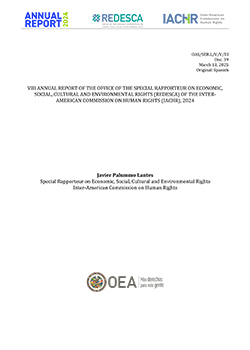- English
- Español

Press Release
REDESCA presents its VIII Annual Report with a structural overview of the challenges facing ESCER in the Americas
May 20, 2025
Contact info
Special Rapporteurship on Economic, Social, Cultural, and Environmental Rights
Distribution List
Washington, DC—The Office of the Special Rapporteur on Economic, Social, Cultural, and Environmental Rights (REDESCA) of the Inter-American Commission on Human Rights (IACHR) presented its VIII Annual Report, a document that offers a comprehensive analysis of the situation of ESCER in the Americas during 2024. The report is a milestone in marking the beginning of a new institutional cycle under the 2024-2026 Work Plan, entitled "A Hemispheric Agenda for ESCER."
During the year, the Office of the Special Rapporteur actively participated in the IACHR's sessions, participated in 24 public hearings, and carried out working visits to various countries, including Brazil and Bolivia, with the aim of assessing the impacts of floods and forest fires, respectively. It also collaborated in on-site visits to countries such as Colombia and Guatemala, and contributed to the preparation of the Commission's reports incorporating key information on the situation of economic, social, cultural, and environmental rights (ESCER) in the region.
In addition, REDESCA attended events aimed at making these rights visible and related to the priority axes of the new Work Plan, providing specialized contributions to the IACHR's system of petitions and cases. The actions focused on four priority areas: climate emergency and environment, business and human rights, economic and fiscal policies, and the relationship between democracy and ESCER.
The report highlights with concern the context of growing inequality, environmental degradation and institutional weakening in the region, noting that these interrelated phenomena are eroding democratic foundations and hindering the exercise of human rights. It highlights how the concentration of economic and political power, coupled with the lack of democratic controls, has allowed for the increase in irresponsible extractive activities, the dispossession of indigenous and rural communities' lands, and the overexploitation of natural resources. These practices have exacerbated violence against environmental defenders and deepened impunity.
One of the main contributions of the report is the detailed documentation, country by country, of the situation of ESCER, based on a methodology that combines information collected in working visits, precautionary measures, hearings, contributions from civil society, jurisprudence of the Inter-American System, and reports from specialized agencies. The report also highlights how the impacts of climate change, unregulated extractivism, exclusionary energy transitions and certain business practices constitute direct threats to the effective exercise of rights such as access to water, food, housing and a healthy environment.
The climate crisis emerges as a central axis of the report. Phenomena such as wildfires and floods have devastated local economies, increased food insecurity and forced mass displacement, especially affecting North America, Central America and the Caribbean. In addition, misinformation around these events has complicated emergency management and political stability.
The Office also emphasizes the need to strengthen tax justice as a way to overcome structural gaps, documenting the regressiveness of many tax systems in the region. The report calls on States to adopt redistributive public policies, combat corruption and guarantee social protection mechanisms that recognize the value of informal work, care and the popular economy.
The report reaffirms that ESCER and democracy are inseparable dimensions for the integral observance of human rights. REDESCA calls on States, civil society, and international actors to strengthen institutional frameworks, combat impunity, and adopt decisive public policies that address structural inequalities and the environmental crisis affecting the region.
The Office of the Special Rapporteur on Economic, Social, Cultural, and Environmental Rights is a rapporteurship created by the IACHR with the objective of strengthening the promotion and protection of economic, social, cultural, and environmental rights in the Americas, leading the Commission's efforts in this area.
The VIII Annual Report is available at: https://www.oas.org/en/iachr/docs/annual/2024/annex/IA2024_REDESCA_EN.pdf.
No. RD107/25
11:30 AM


